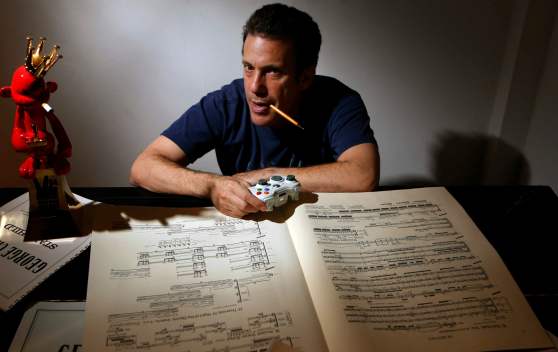Composer Interview: Garry Schyman, BioShock Infinite
Garry Schyman is a veteran film and television composer who loves to experiment. That desire lead him to creating iconic sounds for the entire BioShock franchise as well as Destroy All Humans!
GamesBeat: What was the inspiration for the BioShock Infinite score?
Garry Schyman: [Irrational Games creative director] Ken Levine didn’t want the score for Infinite to sound like the first two BioShock games, so we had to come up with a new direction. I needed to discover that sound, and during the process I shared my experiments with Ken.
When I was composing a particular scene for Elizabeth, I realized that a full orchestra wasn’t the right fit for the tone I wanted to set. Instead, I used small string ensembles that at most had 10 instruments. Finding the right sound for Elizabeth, which ended up being simple yet emotional, was the light at the end of the tunnel. It really led the style.
It turns out a lot of music is character-driven. So, I composed for characters.
GamesBeat: Can you explain the process of composing for characters?
Schyman: Obviously, just as you would in for film or television, you observe how a character behaves and make the music fit their personality.
You look at their character and the game setting, and it is really intuitive. Some people think that there’s a system for writing music for games or films, but there really isn’t. It’s a naturally intuitive process and takes a great deal of trial-and-error.
The cool thing about working on this project was that I could experiment. Some of the characters in BioShock Infinite have a comic lightness, so I wrote a sort of waltz for them and it worked wonderfully. Elizabeth’s theme is central to the game and the music unfolds as her personality does.
GamesBeat: How did you use the string ensemble?
Schyman: The score was mostly strings. The way I scored Infinite was different than any game I’ve done before. In this case, the sound of solo instrument samples weren’t very satisfying. So, I decided to record the pieces I was writing with live recording sessions. That wasn’t too expensive because we weren’t using a full orchestra.
I had 10-12 sessions with small string ensembles to record the score over several months
I had 10 to 12 sessions with small string ensembles to record the score over several months. I also used a lot of percussion, though I recorded that myself. I did have to use a sampled accordion, though, since there aren’t a lot of those for hire.
Using a 10-instrument ensemble taught me a lot. I discovered that you could get beautiful, and sometimes incredibly tense, sound from a very modest number of players.
GamesBeat: Did you use any unusual or nonmusical sounds in BioShock Infinite?
Schyman: I actually used a lot of unusual sounds for the original BioShock, like the sound of people breathing. I found a website with sample sounds of sick people breathing and used that for the splicers.
For Infinite, I decided that unique or unusual sounding instruments were much more useful. Mostly, I used unusual percussion. I brought in a percussionist that would bang on a violin, double bass, and even hubcaps to make a lot of interesting tones.
I wanted to break a few rules while composing for Infinite, but I wanted to do that in ways that were useful and successful. Even though I used traditional instruments to compose the score, the way they’re used makes it unique.
GamesBeat: What is it like working with Levine? Many developers say he is very hands-on.
Schyman: Ken was involved in every aspect of BioShock Infinite. He approved every element and had to like it.
I joke with Ken, “You’re the Steve Jobs of video games.”
He’s a taskmaster, but through that he really brings out the best in the people who work with him. If something doesn’t strike him as the right approach, he’s not afraid to say it. When he likes something, he loves it.
He’s a perfectionist. He has such good, intuitive instincts so that you never feel like he’s sending you in the wrong direction when he offers suggestions.
GamesBeat: What encouraged you to move from film and television composing to video games?
Schyman: I started off in this industry when I scored games for the Philips CD-i in the mid-’90s. I wrote some of the first orchestral pieces for video games. When my friends that helped get me interested in the project left Philips, and Philips abandoned the CD-i, I lost my interest.
After that, it took technological advances in the ’90s to really inspire my interest. In 2004, my agent sent my resume to THQ. At the time, they wanted a Bernard Herrmann-like sci-fi sound for Destroy all Humans! It sounded liked a wonderful creative opportunity to me.
I tell people that some of the greatest creative opportunities I’ve had in my life come from video games. I’ve had a fantastic time scoring them. I consider myself lucky to be found as someone good enough to write for games, and I like to believe that I’m writing some of the best music I’ve ever been asked to write.
Sometimes, composers feel limited by what they’re asked to write. I’m incredibly happy to have found this niche.
VentureBeat's mission is to be a digital town square for technical decision-makers to gain knowledge about transformative enterprise technology and transact. Learn More

